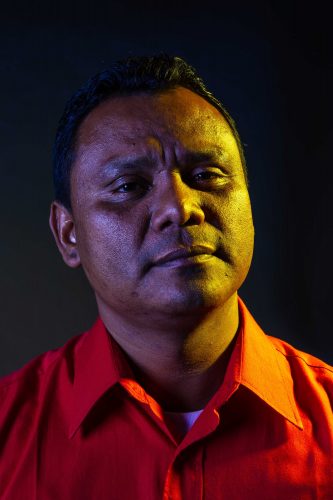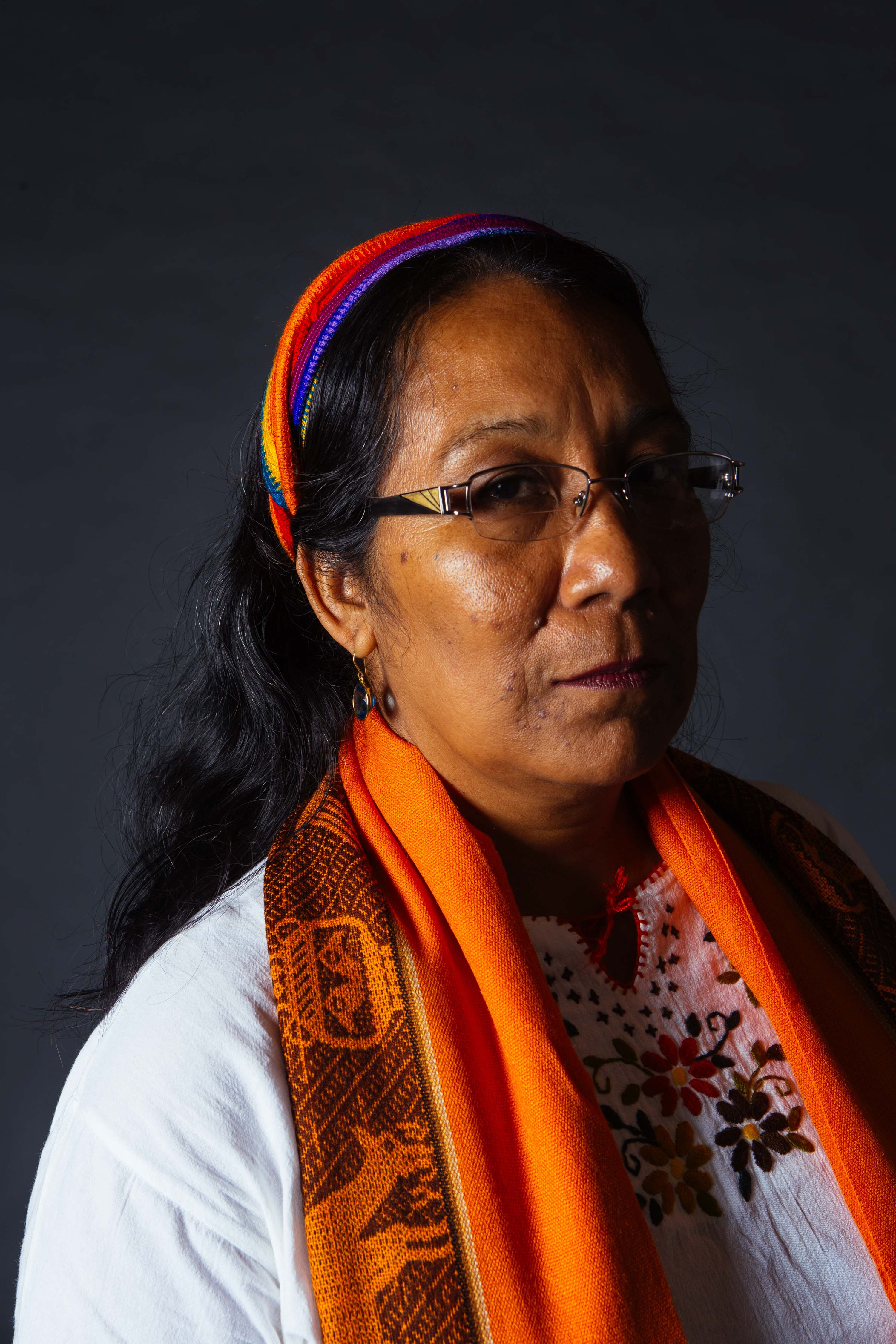
One Sunday afternoon in April last year, Delvin Rosalio, an indigenous rights attorney in Nicaragua, says a man attacked him for his advocacy as he left his home in Puerto Cabezas.
“Hey, I know you! I have seen you!” Rosalio recalls the man yelling. Before the attorney could respond, Rosalio says the man lunged at him — knife in hand. The two struggled, Rosalio says, before his opponent dropped his weapon and fled down an alleyway.
Meanwhile, Juana Bilbano, executive director of the nonprofit organization Rosalio represents, says she has received many threatening text messages since 2015. One was from someone claiming to have planted bombs in her walkway. Another suggested she prepare for her own funeral: “You should get your black clothing because you are going to be killed,” it read.
Rosalio and Bilbano are Miskito themselves. They work for Centro por la Justicia y Derechos Humanos de la Costa Atlántica de Nicaragua (CEJUDHCAN, the Center for Justice and Human Rights of the Atlantic Coast of Nicaragua). The advocates are being targeted, they say, for opposing Nicaraguan government inaction over violence from settlers illegally occupying territory belonging to Miskito, Mayangna and Rama, as well as Afro-descendant peoples.
Settlers are drawn to the area, located by Nicaragua’s northeastern coast, looking to exploit its abundance of fertile land, timber and gold.
The conflict has left 30 of their people killed, along with 38 injured and 3,000 displaced, according to a 2016 report by the North American Congress on Latin America.
Rosalio and Bilbano are in Eugene until April 8 receiving legal and scientific support from Eugene’s Environmental Law Alliance Worldwide (ELAW), a network of lawyers and scientists in 80 countries. Eugene is home to the only ELAW office in the U.S.
Going to the Courts
CEJUDHCAN is preparing for an upcoming hearing to be held in front of the Inter-American Court of Human Rights, a regional judicial body enforcing human rights laws in the Americas. The advocates are hoping a ruling will result in an order to stop threats against indigenous communities in Nicaragua’s North Caribbean Coast Autonomous Region. The hearing is set for sometime this year.
ELAW has been working with the Nicaragua-based indigenous rights group since the ’90s, according to Associate Director Lori Maddox. She said their partnership came during a time when many Nicaraguan indigenous groups began filing legal challenges for the Nicaraguan government to recognize that its indigenous communities needed to have a proper title to bear land.
‘They have taken land and displaced people from their traditional lands. The communities can’t get to the garden parcels where they are farming to plant their seeds. When settlers are encountering the indigenous people on the way to their parcels, there are assassinations, they are kidnapping them, and sexually abusing women.’ — Delvin Rosalio
But when the government refused to consider processes for indigenous groups to demarcate land and obtain titles, Maddox says, activists took their proposal to the Inter-American Commission on Human Rights (IACHR), which referred it to its court system — the Inter-American Court of Human Rights.
ELAW assisted CEJUDHCAN in its petition before the court. “One really important part of ELAW is that we respect the local legal cultural, social context. We recognize sitting in the U.S., we are not the experts in Nicaraguan law, and so we defer to them,” Maddox says. “Whatever they need us to do, we do. But they are the ones who devise the domestic legal strategy.”
CEJUDHCAN and ELAW were involved in a 2001 landmark case, Awas Tingni v. Nicaragua, which led to the Inter-American Court’s directing the Nicaraguan government to develop a demarcation and titling plan to recognize indigenous communal property.
In 2003, the government followed up with Law No. 445, which provided a system for indigenous groups to negotiate among themselves and decide on borders and communal uses and receive land titles. A key part of the law states that the government of Nicaragua has the responsibility to remove settlers and industries from indigenous territory.
Government Inaction
But 15 years later, that law has not been enforced. Ranchers and farmers, numbering in the thousands, have moved into Miskito territory near Nicaragua’s Caribbean coast. Rosalio says extractive industries, such as mining, logging and palm oil companies have set up base there.
“They have taken land and displaced people from their traditional lands. The communities can’t get to the garden parcels where they are farming to plant their seeds,” Rosalio tells EW through a translator. “When settlers are encountering the indigenous people on the way to their parcels, there are assassinations, they are kidnapping them, and sexually abusing women.”
CEJUDHCAN filed complaints with law enforcement and local authorities, but he says the attorney general is not investigating where threats are coming from. That is when his organization, international nonprofit organizations, looked outside Nicaragua to hold its government accountable — and approached the IACHR multiple times dating back to October 2015.
In February 2016, the commission responded by granting precautionary measures for 12 indigenous communities, recognizing that their people were in danger, and recommended that the Nicaraguan government take action to protect them. According to a 2016 press release, government representatives did not respond to the commission.
The IACHR stepped up pressure on the Nicaraguan government. In September 2016 it sent the case to the Inter-American Court. And that month, Maddox says, the court granted seven out of the 12 indigenous communities provisional measures demanding immediate protection of indigenous groups.
Maddox says the order directed the government to investigate the source of the conflict between indigenous groups and settlers and find a solution involving psychologists, sociologists and members from both parties. The court also required that the government send a report every three months to the IACHR to show how they are protecting indigenous groups, she says.
But Bilbano, the executive director of CEJUDHCAN says the reports are fabricated to look like they are protecting indigenous groups, when she says they are not.
The Inter-American Court on Human Rights has since called for a hearing to look into the reports, planned to take place sometime during the second half of 2018. Bilbano says she is hopeful the hearing will cause the Nicaraguan government to stop the violent conflict and protect indigenous lands.
“They have gotten away with not showing up in front of the commission, but they can’t not show up in front of the court,” Bilbano says. “What we hope is that the government is going to set up a concrete proposal to stop the conflict and comply with their responsibilities.”
A Break in Eugene
Bilbano also says she hopes indigenous cultural groups in the U.S. will mobilize in support of their cause, and she wants to spread awareness to Americans about the conflict.
Enlarge

Photo by Todd Cooper
Right now, Rosalio and Bilbano are staying in Eugene, a trip their sponsors — ELAW and the Ireland-based Front Line Defenders — describe as one of “rest and respite.” One reason the two indigenous activists are in Eugene is to “provide a physical and psychological break for defenders from the extreme stress of the dangerous work they do,” according to an email from Erin Kilbride, a media coordinator with Front Line Defenders, a group founded to help human rights defenders who are at risk.
But soon Rosalio and Bilbano will return to their colleagues. Rosalio says their organization previously had 18 members, but has since reduced to seven. He says members left the group out of fear from the constant threats they have received during the conflict.
Rosalio points to an anonymous Facebook post, which conveys the reality of his work back home. The post shows photos of Rosalio and other members of his organization, describing him and his colleagues as “spreading garbage” and appears to express outrage over media organizations’ quoting them over the issue.
“I recommend that you return to your roots, which is the dump. Because that is the place where you come from,” it says. The user’s profile picture bears the logo of the country’s ruling party, the Frente Sandinista de Liberación Nacional.
Visit the Environmental Law Alliance Worldwide homepage at elaw.org to learn about Centro por la Justicia y Derechos Humanos de la Costa Atlántica de Nicaragua’s work at cejudhcan.org. ELAW’s executive director is the son of EW owner Anita Johnson.